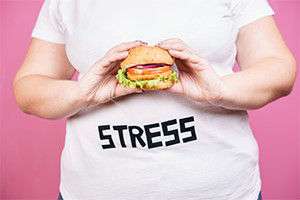Picture this: you’ve just had a rough day at work, and all you want to do is dive into that pint of ice cream or devour an entire pizza.
This scenario is all too familiar for many, but while it might seem like a harmless way to unwind, stress eating is a major contributor to weight gain and, ultimately, obesity.
But why does stress make us reach for unhealthy foods, and how exactly does it lead to weight gain?
In this article, I from leanandfit.info research team will uncover the science behind stress eating, its impact on your body, and effective strategies to break the cycle.
Let me explore why stress eating is making you fat and what you can do about it.
Article Contents:
- What is Stress Eating?
- The Biological Link Between Stress and Eating
- How Stress Eating Leads to Weight Gain
- Foods That Relieve Stress vs. Foods That Increase Stress
- Stress Eating and Obesity: The Bigger Picture
- Best Diet for Stress Belly
- Emotional Eating Solutions
- Impact of Stress on Eating Disorders
- FAQs on Stress Eating and Body Fat
- Diet for Lowering Cortisol Levels
- Conclusion: How to Beat Stress Eating for Good
What is Stress Eating?
Stress eating, also known as emotional eating, refers to the act of consuming food in response to feelings rather than hunger.
This means that instead of eating because your body needs fuel, you are eating because you’re upset, anxious, or even bored.
It is a way to self-soothe, but it often leads to overeating, poor food choices, and weight gain.
The foods you are likely to reach for—think cookies, chips, and chocolate—are typically high in sugar and fat, which provide a temporary sense of relief but little nutritional value.
The Biological Link Between Stress and Eating
When you are stressed, your body releases cortisol, a hormone integral to the “fight or flight” response, preparing you to confront or escape perceived threats. Initially, stress can suppress appetite due to adrenaline. Stress and weight gain go hand in hand. You simply need to understand this connection.
However, with prolonged stress, elevated cortisol levels can increase appetite and cravings for high-calorie foods.
Cortisol’s Role in Stress Eating:
Cortisol not only boosts appetite but also encourages fat storage, particularly around the abdomen—a phenomenon often referred to as “stress belly.” Elevated cortisol levels signal the body to replenish energy stores, even if minimal energy has been expended, leading to overeating and potential weight gain.
Mechanisms Linking Stress to Increased Appetite:
-
Metabolic Influence: Cortisol stimulates fat and carbohydrate metabolism, creating a surge of energy. While essential for survival situations, this process also increases appetite, leading to potential overeating.
-
Insulin Interaction: Elevated cortisol levels can raise insulin production, which may lower blood sugar levels, prompting cravings for sugary and fatty foods.
Impact on Food Preferences:
Stress can alter food preferences, driving individuals toward high-fat, sugary “comfort foods.” This shift is partly due to cortisol’s effect on the brain, enhancing the reward value of such foods, which can lead to increased consumption and weight gain.
Consequences of Prolonged Elevated Cortisol:
Chronic high cortisol levels are associated with several health issues:
-
Weight Gain: Persistent elevated cortisol can lead to increased fat accumulation, particularly visceral fat, which is linked to metabolic disturbances.
-
Metabolic Disturbances: High cortisol levels can cause metabolic disturbances, increasing the risk of obesity-associated conditions.
Managing Stress to Control Cortisol Levels:
To mitigate the effects of stress on eating behaviors and weight gain, consider the following strategies:
-
Healthy Diet: Incorporate anti-inflammatory foods rich in omega-3 fatty acids, such as salmon and walnuts, to help regulate cortisol levels. Maintaining stable blood sugar by consuming low glycemic index carbohydrates, proteins, and healthy fats is crucial.
-
Regular Physical Activity: Engaging in regular exercise can help manage stress and regulate cortisol production.
-
Adequate Sleep: Ensuring sufficient sleep is vital, as sleep deprivation can elevate cortisol levels, leading to increased appetite and weight gain.
-
Mindfulness Practices: Techniques such as meditation and deep breathing can reduce stress and lower cortisol levels.
Understanding cortisol’s role in stress eating is crucial for developing effective strategies to manage stress-induced weight gain. By adopting healthy lifestyle habits, individuals can better control cortisol levels and maintain a balanced relationship with food.

How Stress Eating Leads to Weight Gain?
Stress eating does not just add a few extra calories here and there—it can significantly contribute to weight gain over time.
Here is how:
- Increased Caloric Intake: Stress drives you to consume more calories than your body needs, particularly from unhealthy foods. This excess energy is stored as fat, especially in the abdominal area.
- Cravings for High-Fat, High-Sugar Foods: Stress increases cravings for comfort foods that are rich in sugar and fat. These foods activate the brain’s reward system, providing a temporary sense of relief but also leading to overeating.
- Disrupted Metabolism: Chronic stress can alter your metabolism, making it harder to burn off the calories you consume. Studies show that people who eat under stress have a slower metabolic rate, meaning they burn fewer calories.
- Hormonal Imbalance: Elevated cortisol levels disrupt the balance of hunger hormones like insulin, ghrelin and leptin, making it harder to regulate appetite and satiety.
- Reduced Physical Activity: High stress levels often lead to fatigue and a lack of motivation to exercise, compounding the effects of excess calorie consumption.
Foods That Relieve Stress vs. Foods That Increase Stress
Not all foods are created equal when it comes to managing stress. Some can help alleviate stress, while others make it worse.
Foods That Relieve Stress:
- Dark Chocolate: Contains antioxidants that can lower cortisol levels and improve mood.
- Nuts and Seeds: Rich in healthy fats and magnesium, which can help reduce cortisol.
- Fatty Fish: High in omega-3 fatty acids, which have been shown to lower stress hormones.
- Leafy Greens: Packed with magnesium and folate, both of which are known to reduce stress and anxiety.
- Whole Grains: Foods like oatmeal increase serotonin production, helping to combat stress.
Foods That Increase Stress:
- Sugary Snacks: Cause rapid blood sugar spikes and crashes, increasing stress and fatigue.
- Caffeine: Increases cortisol levels and can exacerbate anxiety and stress.
- Alcohol: Though it may initially seem relaxing, alcohol disrupts sleep and can lead to increased anxiety.
- Processed Foods: High in unhealthy fats and low in nutrients, these foods can worsen stress and mood disorders.
Stress Eating and Obesity: The Bigger Picture
Stress eating is a significant contributor to the obesity epidemic.
When people use food to cope with stress, they often consume more calories than they need, leading to weight gain over time.
But it is not just about calories; the hormonal imbalances caused by chronic stress, particularly elevated cortisol levels, make it easier to gain weight and harder to lose it, even with diet and exercise.
This cycle of stress eating and weight gain can lead to serious health problems like cardiovascular disease, diabetes, and depression.
Best Diet for Stress Belly
Reducing a stress belly is not just about cutting calories—it is about choosing the right foods to manage stress and support weight loss.
Here is what the best diet for stress belly looks like:
- High Protein, Low Carb: Choose lean proteins like chicken, turkey, and tofu to stabilize blood sugar levels and reduce cravings.
- Healthy Fats: Incorporate avocados, olive oil, and nuts, which help regulate cortisol and keep you full longer.
- Anti-Inflammatory Foods: Include foods like turmeric, ginger, and fatty fish to reduce inflammation and support weight loss.
- Fiber-Rich Foods: Opt for vegetables, fruits, and whole grains to promote digestive health and satiety.
Emotional Eating Solutions
Breaking free from the cycle of emotional eating requires a multi-faceted approach.
Here are some effective emotional eating solutions:
- Mindful Eating: Practice being present during meals. Chew slowly, savor each bite, and listen to your body’s hunger and fullness cues.
- Stress Management Techniques: Engage in activities like yoga, meditation, or deep breathing exercises to manage stress without resorting to food.
- Healthy Alternatives: Keep healthy snacks like fruits, nuts, and yogurt readily available to combat the urge to reach for junk food.
- Seek Support: If stress eating is affecting your life significantly, consider talking to a therapist or nutritionist who can provide personalized guidance.
Impact of Stress on Eating Disorders
Stress can also trigger or exacerbate eating disorders like binge eating disorder, anorexia, or bulimia.
The relationship between eating disorder and stress is complex, as stress can trigger disordered eating patterns and vice versa.
For those already struggling with an eating disorder, stress can make it difficult to maintain healthy eating behaviors, complicating recovery.
Recognizing stress as a trigger and seeking professional help is crucial for managing these conditions effectively.
FAQs on Stress Eating and Body Fat
Diet for Lowering Cortisol Levels
A diet designed to lower cortisol levels can help manage stress and reduce the likelihood of stress eating.
Here are some dietary recommendations:
- Include Omega-3 Fatty Acids: Foods like salmon, walnuts, and flaxseeds are known to lower cortisol levels and reduce inflammation.
- Magnesium-Rich Foods: Spinach, almonds, and black beans can help regulate the body’s stress response.
- Probiotics: Yogurt, kefir, and other fermented foods can support gut health, which is closely linked to stress levels.
- Stay Hydrated: Drinking plenty of water is essential, as even mild dehydration can increase cortisol levels and exacerbate stress.
Takeaway: How to Beat Stress Eating for Good?
So, is stress eating making you fat?
The answer is “yes”.
Stress eating not only leads to weight gain but can also cause long-term health problems if not addressed.
By understanding the connection between stress and eating, choosing the right foods, and practicing mindful eating, you can break the cycle and regain control over your health.
Managing stress is just as important as managing your diet.
With the right strategies, you can enjoy a balanced, stress-free relationship with food.
Free Tip of the Day: By adopting healthier eating habits, practicing mindful stress management techniques, and seeking support when needed, you can prevent stress eating from controlling your life and making you gain unwanted weight.
References:

